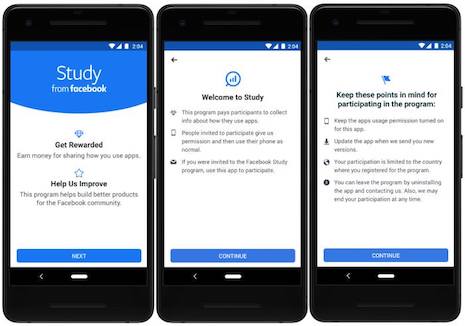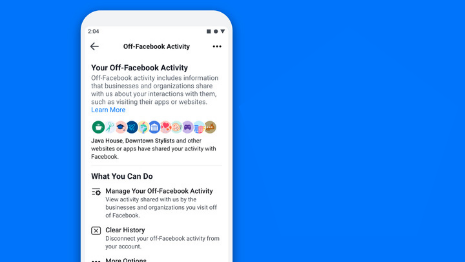Social network Facebook is looking to assuage privacy criticisms by being more transparent with consumers about where their data is shared.
The new privacy feature, called Off-Facebook Activity, allows users to view a summary of the Web sites and mobile applications that share information with Facebook, as well as clear the information if desired. This new feature comes after Facebook has repeatedly faced government and consumer scrutiny for mishandling users’ private information.
“Facebook is letting users control their data sharing in a way that is, at the surface of the platform, not buried in the footer – which is really unique,” said Paige Montgomery, senior marketing manager at Intelligent Demand, Denver, CO. “Usually the fine print and data sharing rules are buried within the company's privacy policies and within the language that makes it almost impossible for consumers to understand exactly what type of data companies are capturing on their Web sites.
“It's equally as confusing for the general consumer to understand how to opt out of things like third-party ad services or retargeting – unless you understand the tech in the first place,” she said.
Privacy push
The launch of Off-Facebook Activity is one of the tech company’s first privacy initiatives since being hit with a record $5 billion fine from the Federal Trade Commission.
As part of its settlement with the FTC, Facebook has agreed to launch more stringent data privacy policies within its organization, including setting up more oversight within its leadership. Facebook has recently announced its vision for more privacy on its platforms, but this FTC-ordered plan is on a bigger organization-wide scale than earlier efforts (see story).

Facebook founder Mark Zuckerberg. Image credit: Facebook
Off-Facebook Activity is currently being rolled out to users in Ireland, South Korea and Spain, before being implemented elsewhere.
Consumers will be able to see and control the data that third-party sites and apps send Facebook about their online activity.
Users can disconnect this information, and they can even choose to disconnect future off-Facebook tracking from their accounts. This will be available for all off-Facebook online activity, or select apps and Web sites.
Once off-Facebook actions are cleared, the social network will remove users’ identifying information from the data sent by apps and sites. This will also prevent Facebook from targeting advertisements on Facebook and Instagram based on consumers' online activity.
“While a great deal of Facebook users are concerned about how their data is being used, chances are they have already taken steps that already exist on Facebook through privacy settings to guard against that,” said Katy Lucey, director of paid social at Tinuiti, Atlanta. “It’s impossible to gauge whether we will see mass adoption or not.”
Targeted online advertising is one of the revenue streams that keeps Facebook free for its billions of users. Brands and businesses send consumer data to the social network by using online business tools, such as Facebook Pixel or Facebook Login.
“For those heavily reliant on Web site retargeting, they might see reach within those audiences affected,” Ms. Lucey said. “However, other segments such as interests, demographics, list audiences and lookalikes won’t be affected by the change, so if brands haven’t begun testing those out, they should explore their options there.”

Facebook recently launched a rewards-based market research program. Image credit: Facebook
Facebook acknowledges that allowing users to have more control over their data may have repercussions on advertising.
“We expect [Off-Facebook Activity] could have some impact on our business, but we believe giving people control over their data is more important,” the company said in a blog post announcing the new feature.
Safeguarding data
Facebook is not alone in making privacy moves that may hamper marketers.
Technology giant Apple is continuing its pro-privacy crusade, but its latest features may alienate many developers and advertisers.
With Apple’s forthcoming iOS 13, debuting this fall, it will be easier than ever for consumers to protect their personal information and prevent third parties from exploiting user data.
One of the most important features is “Sign in with Apple,” a new way for users to log in to mobile applications and Web sites.
Apple will offer an option to create a unique, random email address that forwards messages to users’ real inboxes. Ultimately, this ensures that users’ activity cannot be tracked within the app and tied to their profiles (see story).
Amazon’s Alexa voice assistant and Echo devices have also been the subject of privacy concerns. Consumers can be wary about adding devices with microphones or a camera to their homes.
With users increasingly calling for control over their data, Amazon is letting Echo owners delete everything that they said in a day from recordings. This command will eventually evolve to let users clear what they have just said to Alexa.
As part of this privacy move, Amazon has created a new hub for its Echo devices that enables owners to understand what information is being collected through the devices (see story).
“The ability to serve consumers ads based on their actual interests and online behavior is incredibly valuable, so losing that would be a disadvantage of course, but it might actually lead to more quality clicks, impressions and cost-per-action in the long run,” Intelligent Demand’s Ms. Montgomery said. “Users who opt out of having their data connected are probably not motivated buyers or the types of consumers who are likely to click that ‘buy now’ button.”
{"ct":"I3a2\/t\/1GB0Xhsy79ilhYZ17FBwLZRATKqsX3FjkcBRwj+Dkuw0je2p8Uj1S+7D0BucSWDOmrivhWr1eLIpoTqbSzbVEtTKSukAlaCxmaKk3nhfUQ4JIpXQGlrWultppL5nR\/bHi4rlfi4GPHXOmrb8bctKIhzsNa6e0eadDQlz6jT1YJzrugFdw3FkP7u\/o\/Ik\/FeGacs4819YOZtehqLF4WRq6F8Or8lwwRWpJ5+FEGrKEDGDDzHGHy2HJBFtr3DxhWXhgVvLkIAP7mmvRVxMCYleKudzYdUbHWZGAlVLbyE3g54Axp+q2giwhmfqxZtIEPVN0fhDnOcv+GF4uYqHsmTonjnVORY7\/zpHpmSJhOjQlpHWltvKjARmDIb97mEG1naQhdEYc24bypJ2Tp7kk1JPuwPNSY3gUY2F8cvTRvjrWCmee63lKgkUc\/LPGNt0+LiHu04rCgjd95sXJc3PznxSudaiynjzyuWR4K8q1q8uda9fnkNhCeafw\/oOe3hLfJaO3A6O3xHC1DVJHcVvaHmxSMYHTyk6ISDuwEDVitFQxH1FdeaSJh+aR\/8Fffxb9Nwqhg31pBpyiSS1o0x9oieUVukxDFEgnOL8JgLAt+MVgVJ4p8Dt6357NjsmxjtGlYglPKYmkxQBmDohu4ZF7U3X+zsmFew3MmKP7nW63OSbM4xwjadv4gjoDTHAXQtvGK+sY+RpRWFbUSNAOO2dpX2KwWAfzgHlYNXJDRC6MZ6R1bGusctEt7dg3ioL0rytbQ39Ex2tVyrtWiiV9UJn72B8ww5BtEP8S18dpulCiJuzehmCkeqWRH6t7SsSsTn++31RmSnrotERhpsy1LiuBHq3QQFL7WALAhfhGyOmuOJc8nSje7H825wJ8VNcfJQbzobqKxxKlhLHVRjDUQuY1G4LKqdbq76CKlXeJFNkHSzOmCbMExpid5jX0CE0wOJxUxZ6H8wis1FTsRX0NU7NYFxmj\/0NWAduvHz76X9donkdDQnuwjABNcUoH6QI2KPVkeU2u34Q3w2AngPKMLJUKMMa6FJUNwz6KTwsXxM3rPQcOuo6Mkt9fuVbJOLti+hpubIeaswqLlF\/+VtGjuIXdNl2FVXZJn+WFnNLmPVJNpIPno+5jJ+cCzUym+1IwXEzzZ4gwoMadA3queiX7sbYo1ogTqe1RLyhjWGytm05cUr4CXQEyHYg4Rt7msRnIq4+WrTMDiTSSAzXOHOAouJn0smV\/krq\/dpH\/pa3wKfyYjIT\/Y\/xdeniOyObVTMXS4mLLogO5rPS6FDjQzLLPA2pcdEo\/\/Nu3lpnGHa98ZxYlYIWKuzOCdujzSRKSNSmsjmPpm0AqGxkSzOI8gMC5GUAhjZowJClkqv2DC0zeS3Vi44K3l6H4oPAN7ZNOUWcnH00aAM7bWHmhVbZUu6Et25K6k698JyKAQPpRHpDsPabFyNyvzns7QDgFaRWNpyg5bHahdAxDzdqpa02HVcXN7ByF65k\/yNu3yNqD6poXCe8DCLX2fn9\/WIJzqo8AKdCbBQMJ5QWxXEhwl464E5pX5TWOYfqVQbSzzF6UcUg3P9cQAZro6zGTfDsMWvv74yPtGGWqXAZ\/0umSi9wS+\/36UBG\/0Obj4oSq\/YQmD4w4FUWj6lfxIeEl1IKSsPZuXKy0z+7lZkIar8hFjVV6vPhRUO4UIfoum9kgQLQUGEr25Gj0fu5NqzUNAMjtyuNQDaKoz3dgXvFeRPSEoikSGohLDq7PH\/ntUOZBSIVghxXP5HS\/7IoM2YKAqAdO5m++XMShXdypc0hPTzDMANckTE6bhtGM5V+zgnPe1N1iXhBaVwqGoHiVYktcFlmw9RkqhPfQ4MZhnTxlZ7DSgBJwwdkgZb7rjYIqlC9ayWpa+lw8Q6C43xCfNiPrKQM+7nl\/mlLZZieDzfAVNcLrZHaUcAe5+w8Ep09vS4LckoDwNe5uygN+rwGVNNzofbYN64l18nUgmQMNCFpbXb0epjLDsdqaiTs132BtOh\/m+QaJTvcsZBwcdoSFgIPF6IHobHGuLuHNR+VwJTFpCkIdm8zlgoqukK9o\/RH9lC0fVOQxhui3M+FCp8vMENfiN1T4Ars\/avRVVZy82dHoktX\/VSf4HRZg7Zjg7XtuI37Q7Bgwbu0uNp5TuNj5xOP9ntuVFn0xrEpVtYF4Q7jMi1J6S0UM9MsmVFRC\/yOIFAAilb1Sx2RkDv0qCdF7RQbfanVM8kZTRsYH4eZMWasJXxqipgSOjXU6X8bXMq6tCpATVUs\/OngVceo+S2Gge+DvLgwqDtWRXsrKxRRkvs7ZMpp5cvWh77R2rNaRMTm811cR1hWykVOaX5IbxL9Qd+sP7XHD0p91XhuFti27ddHLX5JrMg6nhDW62F3AalsbqPKLpR4NLGikCYD+c8eFhO0K4u+3ivBaLdzoYqHGtIYCttupCGZYR9OSTLb15kZnmdlLgz2ij7XimPqXiRbiIqOoNwMJsXs6ToV4+Tl+OKwgMF2BFJ8uCESFS7Dl6lhQstYsUA2cYBVKsXXENNFOoKlIsbgHs0cnG8pxZa3k0hIop6ZmXELYlWtpy\/F3a8WH109VkkwuPEDL\/APsEeHSHVpJr+ZdqiG3wXwRvD12B0YRXkFrwtF+1UEGK6vA1MXC\/0RFuuz\/P9ydTqzXKjIlcEAGiqwO47NauyAFniwZ3vM3HW7Rbldj7JfYmPg9D+pwuXXpzG\/sSMu8kqstzVhQZw0LjR0xQM4OQqOXpyCXauguqHT7N7JfYvcYEcumaABD772nNPdP5EXNlo0NyuowXilxBfpPh+0z17DXLICPfwfFghdK+PPGl9szDmqmgyW\/FPZyrFL5LYeBsaPpZmWLt0IxwjpVEzupDmLEeQrRk+aeewbg8LKrYpcXvRy9R3i4dE0w9xR6TZ\/Y0+5MLJIhJViadsjwXtepsSt6RcdhL4xqYl4J3ooJ+Gpo+K5wXJ7pxdQd1qa7KOM2u83TbF1Jrm5OC\/VLeT1I\/OepYX5xZZKONXtIF3h5BcP6osjibE\/UMXeIYLLlnPJ72CDFpNvpwlk5hbK8KBcsokyka+GhKMFbH3VtmvZcHg0prS4PpdNlRJD0WMkRMNYeqi+QVEHM4JOZFpaOW3wMMs0pCFYkLJNA0O\/ahW\/Jat\/5rANu6pQ377ly9O3EMI4p5O7LAQYMmBpFWwukBrWEC8XJOoSdqSEFg\/YpG4rPNBpudF4LN6oSoZvOLi\/9R5p560gXISZyY\/17wuiuY6sMKn5Qnx4KYVxnLkeYmCYjtuINSx8g6ZeAniH83rX6fIyUPnGFqh1K9jMLGnb+LKB7dLzOjAcTwYWKqyoJAhu2ahk1M\/X+L4mi8cqV2UgZBFcYaQngKvXEB11\/6IoSfZ8+\/Xqkt8E90GoKO+0I7rgKjp4hCUg2Ppan3uA2rME626HQ20dkTEE1z5bgqkRJRcm+p0T4ESpCvnBByzpwE6iDZkOwqkuxoHSHMg3XcRcuDEp0mUxFBskqSyAL4XtXjKprHRFFAPmW9ZPn12lU2NB\/p1wjxPEZXsdchkuMEOCvjoDYUnfc4XtSDyCtgMjUMUW03r2OFf4xgdNbUC2WfBFzF1HdwEo40HEcDg41zihWefHGiAwHJjzgg30HybM4Xb3+w7sGM3PQ3Ln9NrKUbUKCUgpM3dV1JC9B3d2AodphSTvb6nl4zX\/pv0D2SngEztDN5+2zId\/65X29QNElF1Tvx+fI2sfIud5YBBlJJx2DKrb20CiL7xhH+pZUzQSfrZPss62AXxT33XiUUlsbc1vpDbJ5k9zest0MsX1zoNrmauYw4sNzS9LvpQR1HFnwLkONogwRof37yn1QAvDlRbj62HnxIeKafBfV7gRuU1d3TtDd1aonU03ieQuJQAYI4KKUuy\/tnc5ZbcGhIWi558EmkPDKmDPyUZXstnNxygtUurguNKSorOivjWWRuD9o1+V2Cm\/pwSlt7gq0vwqzlZDliisu07DBbSSmAz7IM2ycjMvltKOYtMtBV\/K03LhcsF7jepFnc+TIO6AcLEp6N6yfPRoFLYdOHH9he0ZJcj85szMmPVzs2s0\/V7ZEd6bx0+LTTghTvqbP9DWEdgHUEe0hrnZDfvZ6RchJWHDGn\/DRKBAK2GsHLU\/VQLla\/Ew\/0NPueTKwxQbgrgXXyFTb+RYJ9PSumifI4c9CtVK2uknJQeLXvUJUgOYuvl7h4ZMLb+KfeQRD+5u3SCTipnBbkvm8iXlbDpJbeTluvj2+d21frIJLMaameP1t0a9pfDs\/CzIQ4R39Y\/bta85UupgShajs\/Dx13B0QHArDIZMWC0Lc\/eqMYIpcNCmf8XMIEaVbubfKCAqVst66CThj812nq\/u1fM9r35IHM+MMSzDBxWkh+\/agZPWCMOLpJXfa5kZyVq4d6wFzleIyD+rYTRqHJ6jxczQBFB6xCuX5zdI2\/QJBzt\/1S8A7tQ+gIeewBWbhvP+4r7PTKVDeDc6Qcw5e6qYujf5XNDK0u8eUUGGMQj5lOR23LRXOMdDSDFr0TUiEFS7SClVbKCjBsmDsd6fHUFX0RDzm8QZGy\/nD+4t40He1WT0y0nz6tm6x9B1KsjHNewSDBflsgxqo0JVJrEY5HC8olg1HpqVfIDN1TpZY1waoWRHAZcBhf0g1dJ7RyimsNqrhpCC6\/jg\/2Ob0z6NoDY\/zrgGrlepzlw2+S8ezBaTFNmxnagqYjOd+9hsKcmdgNiLVoj8SfBEZfdVw2wZ7kocjRGb\/mruk\/TnLC9jl+TaKQYHhQt21\/Cu3UhCQ5D8OQVEuYDYcXpLoFQAw9tM+uef1l1YGxS9pR2TWJi8N+0KTa3y+rDAS1Zk7nBhQS3guLgkIGYun88v7vUCCZMg4EE4QBfseyUTxnkbxtAmPcVlY4DCqXvwbwF4ZDt6RHGawzaZqmLjl7uXm3Y6NTKCGNlHn9SWOu6H0KbwJ+GZ6\/tSNj157nnp7fXRQYFIg6qcYgq89QWUxEELUonDkTh+2QNT5Ty3Z3uVac5B52ZldeUaGayV75hIx4dq1lZq7bf11h4cXs9n+WMJGhYSrsrYDr8A13Ow6XZnr1PAnNcmbbT8B0nu3plBhqH6jruhIluNWZLoXDzxbdZ8nzPw06oSXtHkajCCETejO7r9pGfPyu3B8JzAdyuLfVI8xpzxhZseDkZavsBVGgbWnJNo0OJpnnJtDULs\/vYjGpmOPTUP\/L0xNkwo8posiT4B9MkCGpyLwoVvT0cqC3nwTM9at0MQLS3LLADwJzwN56cO\/d4eGYzipTKr6\/aOWcXQrVYIiok8lsc0bnnWNRhtYQmbawGYvGjgqKGIqR+9DmA7AkoLgs\/YH50rBzEzpGJipITlMQE5hslAEjt2jh3vmG664sH9IMg54CV7H9+RyVBh0uvRbX+F4XioXn7vqWSFsTlI5JZhW3VVQy2YmDIxur8pbR3OeSd3bXRBXCGn3JFx3rs1Xr7QG+RIrfh+qXq1cZqBVNHAaK08Iy7nLSvTRJ0F9NjyUUoh8Dd7cVaD5XqvstOYHdvxBWAR6I+luVqmQsMedu0S9ZjGWNf\/vQUWZAeml2K9SkjBDqavJ7ZFJBsI6mOl7n9I+DXFe6vc5FkarsHq1JeEMRkLWUH\/N3JFXidjTW5yx+4iAWNeSoFb\/KvkvOkg3vhDZIZ5uvo4rEi8XHL6CBkhazoYgxtxiZl8VZGv4sIsPXdxUHCCyonUJA1F\/lC69HTdP\/icr7FdK6i57oyf3CMBZ4\/syf+WmSuRHj6ZuLNkZQK+5bZjHVSdv1aSGNzWwxM1KZQFOeyO6WwcYE+\/l1vGN\/7P0Tm+jkZZgzcPcTUpQmnskPcwhI\/+oXM3qIGtWYIvR6VaGaKU5Lyy3RmPuzIleePvvC5d5r+DvrBDDwXKWJ0+1A3K4IlWb1DFCTWfAwEXuOuz83mx886wXnZKx5KSRAci2wPZf\/NV9EY0k47MYe8zzGkbRQNjjIMW65dmRkPu306u72ilaI6qhtGLcB8\/lyyW8pz9qsOwEasZUQ+eUuXETny6R2wFCCdhPVM0lNusq291jZ146VgM8IE1XVfSBxFC6bETcj1Wr1vJJF9917JxwMTxwHqXK6OGWDdc\/4AkYjXN7Wa4f2YrGvb8k+o+FCbQ5AcrDUdA0Pdipewlq0YLsS2TohkB5\/zwoHJduI1Z5KwwdOWBLgXN2JSozE6U4venySt+clXf8cqf0VM4n6xDz36QWZe9BoCwE\/2ytmkaASeDyNutsHPTdFfQMw5vHtxrkOLcYmKj5AnHVBONJn3LQkFW+EFCk\/r8FhQj8fkdM8XAWYM5hjfjJFad+X8mSpVwW5X2YpFaflX5XkPDcjmCdyPanw3aQ8K4BH9ncf4+gmIsGemvBUrJC+xJSwZALVDMeMzQ4K+yVog4encjHI5TrZY+HqMVZ+FHZ6kKCbUUYU8zCqw8Ipg4FPzKOt9+oXhP0aU1zO6Q5AwSImUlUU4RD9rebwxMjWa1ZEL7yNuJ7ti2G10wRCCPmbiLmSjKTshfsCfRXCPdl10mwVwlIowU815OyIkGUsML7gmqQciJ7B+vjeEmb1RQO6MZb+Fnank4QP+3pMd7OwsEFFPoC3flZzAzSbNw1GkLH\/\/JpIOo4iH4GFd0kiBlkenOpfkAMP2OmUQXQS9h8+MG1J9n1hAPRYWKjT4kDw+qMFwZWmrX8ucqTrhy3OYT2oGkRlAFK5sBp753RcPeRKOaPZjCE7jN7n7+Ur5xbjySQDfPkXAD+QGf0TYSPo57k6vvciS6rS367IRPfBmPouOBk7k1rxn0uJbwgTWaqBYYDyu\/S8FyW\/LPabzmfRJ7vduyusSsZvyX5uztWEHwLQOAWl7HAIruE4fYgILclxknSb4bnsz0pQQcMFNciXocO+OS2PfF\/k2tneIW1Y8MkUiBXfY4vtKWjYauOiT9yLJRf7ajXrdlGHTByYFh+0zZPN4jAi+rbwDyz+mOkAXykMsFWctJOQlcwp9fz2lgpnHqdtFYCgVgwGuIbpIMXIYdDay42fE8EUFlrLdzjonl3OeX5e4L2S9gOE5mlf6rVufgtswUSW9rWAp6YeacxH5TmXl+8FjWp6Y\/kd5wa86YY6UH8jBYRt8xdG0eNf5ZWZBnGnD3GnzO9R6djhkLMOhhGcEUhf6ziFL1gptDvL\/Fk4+Y7IRaHdRACa4K3BxV0JAVKZUSaQk8ZmNLV9IlJmhI0YImvPhbfu+h+okzmtvMUIElNlhKTWIVJlopDIMS4U2dadpAuFsFstb6lBhQS9AdFjHID5m94EramidEHAueK3nWA47z0y5dzdBgvmSHTuwy4+6yIbNvEbQ3ZMkPD9xd56FSPvbMWDvzlcMNE1e1YnWJj2aJdRWGULIxb4l4kcKqSg1DXrYGcpgTcNi\/Bm89GpU9gtwH7npf4X0K67d+7uAVrXWxExrk5s2tdzQkuWHsjy1uxcDe1V0QmAuqZwEN8rwmYrMgwzYTjIVKqlEpaUCrVEDbNtpFlfN31pcc\/Ocz3EGkz899OA1vcRyCwBRUpwmc6FPIPBr8BAfQ2T52lY89zmZ6CHtgSfK\/nk7t6XSAiOsrIaadY7kuDagmigiSW0WzuT3YNZ+Cty2lpDbFI2OJdmq6iuZPx3gsnutF6CMcDqLSZ0\/Z2eWkoV7rgamRJmpjbNbUKufa+yNqe2g3cWsRc84bJQZ3Xo4YD+B0wKWmvQoWGf9EO436oSMmQPuLDG0B4BrEzz3U\/3DlNzVUfZB2803ecShSFzgPMcWLFoqmqhMhtZcVF4FXXzIeIIHlq0g+xupYVp\/GZqEU4oc1GFFK6snnhVj2Ytfcs3nEu\/Hb0h\/RhPn1PRZbd6fPXuVjpitzmS7rWZH+CHQpuWetdXfyn5NnIlxq7bd4ajplAeRnOImkos5OG8dHV5yYPzlMkABxTpsv21vzs+ug94X5wLMxVcZ4w4wuLG1fEmQzSngUdKBkbP76cSxv99siUtgYAlaR\/fOWhe0iSll7iDUZIed5NhNjkZ+wlU4G3u1W2JEKBRX1jdnmN4cfzgLxqNd\/N0kMwkShcwfVvrubHxJJXVyR\/F+yPr9eSJbEoe2x11qNrFNcw0pVwJCJD7WMm+DsM4g8PRvuOclgwdwLLjSW5rOgIyu3m176FNl5lIMlbK+mb7qHRgBd0roh3yjhJVRzPz\/GwXaCgyZSqi3JiqnsHWwo\/bTGC3qj4NJEU5GzcA2lHFYQri3jVER0RKgXSLnWGCLxN6Cnh3C4hoPgKFsIIlJv0JJujaQplWgw+b9OMlZLwHia8GUUsJ+4vxDu0bXUQdQiVgLkxCZBc4QvLEMZ4IKbRePotkg5gaPioqnRKO2uXYt6LEiZy8eKZ1LHuHIJo2ofP5HIJZ69IhI5JDAPZUH3Z\/qj0jMlNoEMMScUNZwXhChhnRuUE5xbBJNqax9xnqn7CEU0kAXQzHqrxGBiSONW3HJH2chjx872Op43\/r\/Y2LIE0LagwY+tAWLingH5q9V1Dsp+LD3g+l40U+Jur1mOZa+HO2OtFUhNb+dNYPGvgi6ierIKdb5QLKBw\/Jv40NmPabxVwoJb76u4kSl\/e0DmfGB2dQ2GfKZLLuX2CPWe\/Dq9mnE\/NIyTOywJn1Vsn\/nmbnqR59GMONMBEIjYa0UI0XjUwypUJ7tF+TE7ANufykYNPdrIGNThzWs7AeQZLlSVdrIS8x0AyWYJhmQw7WJE+WAKsMHqdEqVJlDoaJMdBGkiibmZc1AQEa97VmZLHG3V0\/xd8l4Fb7kgCJ+MiHoWYGvVxXqmxSifkeB5b7E6TgiYLo6XJeF85IfV1I8315qvvc9kmk+wmK51YzxlkBJBq0CeewhtgQokF0m5AahCWmZSHtFSM0d2EhntEgPV+mqLYgOSF02W3NyStRjiXZn1EVCvIg0G22mFtFhtqrkBX4lNsXKIDfRdcl\/LAH6MtMU2xenW1WdI4XmjD3woxUl3m0ct92yKU80SxWUdZkWj7xvD1Q6Kg5NhS7uJqM2VdEqJQF4yoJZ+Z8XaRr87MJo9WxejWIvKEcIvJhTQezhWdurV4Aqv4i4lVHm3hJUP3k+khtUwo541BHh8qhJrmpQkpdX2YnM2v70Vm+BQVlN9N3cbnFxXKpRx1zi7VNlxPkDdhdNqz6dDneRz2cqqa9dncxvoHTHsitgE91WqdkldcClTw0HYP+Qerrsnw4yLRfmjhh1sYnCY+NF2mUM0c\/kXEHogWrV7dtBGZAIkMKN4I5shHPs\/vrQlZgyEarNdvLI\/x0dgrxTZuwSMfmuIrvMJ\/qt+mWkBovKApVnOLUkRaKPmuX15dsSwixrew0uX9Zegzl3uqGXPTFkVl53tBVbF25ibndtfppMFE4iV+inRnctN43AjpnysO7q7frpZNTsOvCnkJgRUAksL6kW0waR3QmU1Gqtqpkvf4DaFGBLkTT3m28CVJpvcmCqlIJHaFvt\/KJm\/8cFMEWA5\/9wgVbm9hDxaSpIy7HVWWBv3\/xpVP7vymVdGzkTyS9MJn03jtWfRMeeVnsq2lNxGQGWDacCgcwZOoycx7YwH3OGktLk\/q6jwIh\/iUNnGkbJMTdw4BTNg\/QeOnM4q6dodNU8mDOpXXJmjPp6mqfnLncG1jDcnO91o\/E7rdl7tHWtLtvdW7OFCZFgwMw0Gc13YzZUbx78GGrUA\/nXjpThc1mOes7H7kyw0kmyHdoJ8uuI87AXup1GVHXPuwQL7q6dne31KLylSVpaKKMkFq8HdnnoE2ioMkhHT8Nq8LzvXP4A94GhLojTAhePl2DToAk3wLjA1l0MSHNbH0uCLqRpIlj9E6BkSdbQPkx315rX7QlWAxwwQyXCqfTphFT+KaDr\/tjeWPPx70YMRSbHmP5cYWewCwcRfqLuiAkvniT1YNfR9bau4NV2yATTwGYXTQF7hzwuHkYOSJZWGUM60s6uFbaIzvobavSdP5WqU2hvpDIzYghOKY1CBJGt0\/bObUAkp+GrwzKXFVNEYhCmJ53XdYbFQpOaZhMgTiVAOAkqYMpd9kNmWeRUXGm7K0qRjP8X\/s5kraapLfqoSMrQp03s6sZknQWkRW3h67B5AIPdBzAVvvL2gNm1nMnCqHZFmIOAR1wsrXLJDd47uOKXA3lnJhJwPYNH2AIuyryzmDOlzWx3Rcr0rn0yyaJ2yz3TLcHL4t","iv":"a67f932f220cd49efae19f2da4abc24f","s":"5c7fdf5eb1bba614"}

 Facebook is giving consumers more control over their data. Image credit: Facebook
Facebook is giving consumers more control over their data. Image credit: Facebook